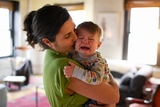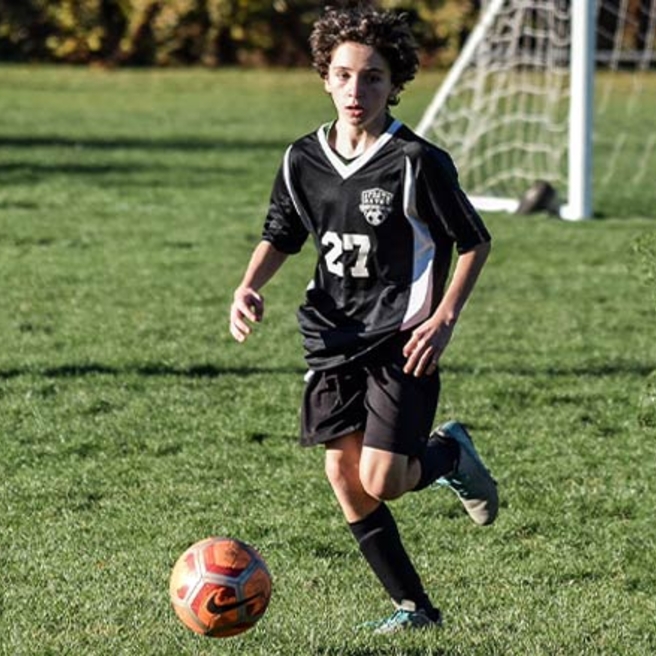What is respiratory syncytial virus (RSV)?
RSV is the most common cause of bronchiolitis (inflammation of the small airways in the lungs) and pneumonia in babies. It is an illness that often occurs in yearly outbreaks in communities, school classrooms, and day care centers. In the United States, RSV is more common in winter and spring months.
What causes respiratory syncytial virus (RSV)?
RSV spreads when infected people cough or sneeze, releasing infected droplets into the air or onto surfaces or objects. The infected droplets can then get into the eyes, mouth or nose of people close by. RSV can also spread through dried respiratory secretions on bedclothes and similar items. Direct contact with the virus, such as kissing, can also spread the virus.
The incubation period (time from exposure to symptoms) of RSV is about four to six days.
Who is affected by respiratory syncytial virus (RSV)?
RSV can affect a person of any age, although it is most common in babies between 2 months and 8 months old. Most babies will get infected at least once by the time they are 2 years old. Babies can get the virus more than once. Recurrence throughout life is common. Babies born premature or with chronic lung disease have a higher risk of getting severe RSV.
Why is respiratory syncytial virus (RSV) a concern?
In babies born premature, infection with RSV can lead to severe respiratory illness and pneumonia. The condition may become life-threatening. Babies with certain heart, lung and neuromuscular diseases are also at risk of severe illness. RSV in infancy may lead to development of asthma later in childhood.
What are the symptoms of respiratory syncytial virus (RSV)?
The early phase of RSV in infants and young children is often mild, somewhat like a cold. In children under 3, the disease may move into the lower airways and cause coughing and wheezing. In some, the infection progresses to a severe respiratory disease. These children may need to go to the hospital to get help with breathing.
The following are the most common symptoms of RSV. Note, each baby may experience symptoms differently. Symptoms may include:
- Runny nose
- Fever
- Cough
- Apnea (short periods without breathing)
- Listlessness
- Poor feeding
- Wheezing
- Retractions (pulling in) of the chest wall
- Rapid breathing; turning blue around the lips
The symptoms of RSV may resemble other conditions or medical problems. Always consult your baby's primary care provider for a diagnosis.
CHOP's online symptom checker can help you make informed decisions about what level of medical care your child may need, if any, and steps you can take to relieve symptoms at home. If your child has medical risk factors such as a weakened immune system or surgery in last 7 days, please contact their specialist.
How is respiratory syncytial virus (RSV) diagnosed?
Diagnosis is sometimes difficult because the symptoms of RSV can resemble other infections. Illness in other family members, other babies in the hospital nursery, or the time of year may offer clues. A complete medical history, physical examination and nasal swab of the baby's mucus may show the presence of a virus. This test is usually performed in the Emergency Department if your child needs to go to the hospital. Primary care offices usually do not offer routine RSV rapid testing.
What is the treatment for respiratory syncytial virus (RSV)?
Specific treatment for RSV will be determined by your baby's primary care provider based on:
- Your baby's age, overall health, and medical history
- The extent of the condition
- Your baby's tolerance for specific medications, procedures or therapies
- Expectations for the course of the condition
- Your opinion or preference
There are no medications used to treat the virus itself. Care of a baby with RSV involves treating the effects of the virus on the respiratory system. Because a virus causes this illness, antibiotics are not useful.
Treatment may include:
- Supplemental oxygen
- Intravenous fluids (to prevent dehydration)
- Tube feedings (if the baby has difficulty sucking)
- Bronchodilator medications (to open the airways)
- Antiviral medications (for very sick or high-risk babies)

How to treat RSV at home and when to go to the doctor
Advice from pediatricians about RSV in children, how you can treat your baby’s RSV at home, and when to go to the hospital.
How can respiratory syncytial virus (RSV) be prevented?
Key methods to prevent bronchiolitis include consistent handwashing, as well as keeping children home from school or daycare when sick to prevent the spread of germs. Anyone in contact with your baby should wash their hands with warm soapy water prior to holding your baby. Keep your baby away from tobacco smoke as well as crowded areas like malls.
In the fall of 2023, the FDA approved a preventive monoclonal antibody medication called Beyfortus (or Nirsevimab) that protects babies from developing severe RSV.
Specific recommendations regarding who should receive this preventative medication are made by the Centers for Disease Control and Prevention.
How does Beyfortus work?
Beyfortus is a single-dose “monoclonal antibody” given in one shot into the muscle, like a vaccine. It puts antibodies into the bloodstream that will help babies fight the virus, even while their immune system is still developing.
It provides an extra layer of defense against RSV and decreases the chances of getting very sick and landing in the hospital.
Because this medication prevents an infectious disease that impacts all children, it is included on the childhood immunization schedule for all CHOP Care Network patients.
Additional resources:
